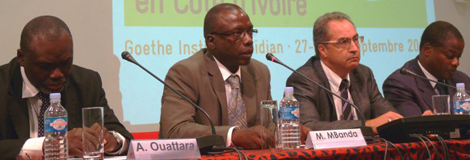International Catalan Institute for Peace ICIP
Final summary of the Seminar in Cote d'Ivoire
30 de Setember de 2010

The seminar “Conditions pour la consolidation de la paix en Côte de Ivoire”, organised by the ICIP in the country's economic capital, Abidjan, in collaboration with the CERAP (Centre de Recherche et d'Action pour la Paix) and the University of Bouaké, closed on Wednesday with various calls to continue debate and study the approaches considered in depth. It was structured in five panels, with each subject considered from various perspectives, with the participation of academic researchers, representatives of NGOs, international organisations and members of the government.
At the closing session, the president of the ICIP, Rafael Grasa, highlighted the "deep, rich debate" that had taken place during the seminars. At the same time, he said that there are many conditions for any peace consolidation process, “without any certainties and without any demands” and without any universal recipes. Grasa also warned that peace is not feasible without the State and without civil society, and committed the ICIP to continue collaborating in the peace process that has begun in Cote d'Ivoire.
The seminar aimed to consider the structural causes of the conflict in Cote d'Ivoire since the late 1990s, beyond the conditions set out in the Ouagadougou peace agreements signed in 2007, which among other conditions, provided for presidential elections to be held. This conflict, which is aggravated by the economic crisis, has split the country in two, between the South, controlled by the government of President Laurent Gbabo, and the North, controlled by the rebel Forces Nouvelles. It is hoped that the elections scheduled for 31 October are a step forward in this peace process.
After a whole day spent analysing two of the structural causes of the conflict – access to land ownership and the definition of Ivorian nationality - the third and final day focused on the legitimacy of the State and the need to seek prospects and encouragement for young people, in order to facilitate the demobilization and rehabilitation of combatants.
Conditions for the consolidation of peace in Cote d'Ivoire
30 de Setember de 2010
Starting on Monday, a hundred people participated in the seminar “Conditions pour la consolidation de la paix en Cote de Ivoire”, organised by the ICIP in the country's economic capital, Abidjan. The seminar considered the main causes of the conflicts experienced by Cote d'Ivoire since the 1990s. These conflicts have led to its division and prevented presidential elections, which are now scheduled for late October, from taking place. The opening ceremony was attended by the Spanish ambassador in Cote d'Ivoire, Cristina Díaz Fernández-Gil, who emphasised the stabilising role within the region that the country could play, as well as diplomatic representatives of Japan, Canada, Liberia, the United States and the Vatican, among others.
The speakers agreed that the presidential elections, in which the incumbent Laurent Gbagbo is seeking re-election, are but a single step in the peace consolidation process, and not the end of the process. In any event, it may point to the beginning of a new era which reignites the peace process, which has been at a standstill since 2003. Francis Akindés, head of Cooperation and International Relations at the University of Bouaké, warned of the reluctance of the countries affected by the war to "deal with the real causes of conflict," which in the case of Cote d'Ivoire include the right to land ownership - forbidden in rural areas to those considered foreigners - and the definition of the country's nationality, an issue which has defined Ivorian politics due to the arrival of thousands of immigrants on neighbouring countries, such as Burkina Faso and Guinea, during the country's boom years.
The role of civil society, the importance of reinforcing the peace process from the security perspective and the need to end the use of ethnic differences for political ends were the other ideas debated at the seminar, which included the participation of representatives of the Ivorian universities, NGOs and official bodies such as European Commission and the UN mission in the country, the ONUCI.
After several decades of economic boom after Cote d'Ivoire’s declaration of independence, the economic crisis of the early 1990s marked the beginning of the decline of what was the world's leading exporter of cocoa and one of the most dynamic countries in West Africa. The clashes between presidential candidates, added to the impoverishment of the population, were the triggers for the two armed conflicts that took place in the country in 1999 and 2002. With this seminar, the ICIP aims to contribute to the peace process by facilitating debate and contributing ideas.
Opening speech by Rafael Grasa, president of the ICIP. (French only):
![]()


